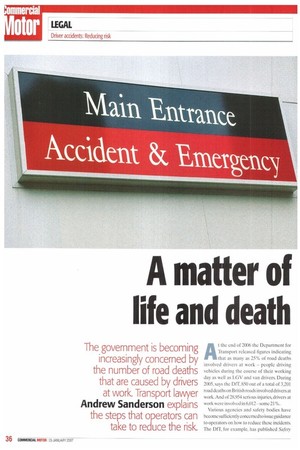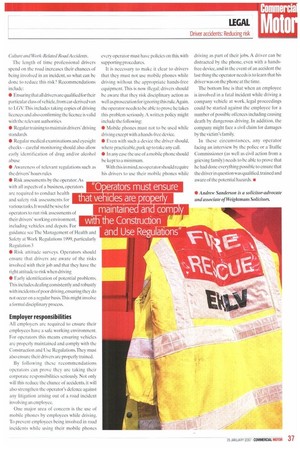A matter of life and death
Page 36

Page 37

If you've noticed an error in this article please click here to report it so we can fix it.
The government is becoming increasingly concerned by the number of road deaths that are caused by drivers at work. Transport lawyer Andrew Sanderson explains the steps that operators can
take to reduce the risk. At the end of 2006 the. Department for Transport released figures indicating that as many as 25% of road deaths involved drivers at work — people driving vehicles during the course of their working day as well as LGV and van drivers. During 2005, says the DfT, 850 out of a total of 3,201 road deaths on British roads involved drivers at work. And of 28,954 serious injuries, drivers at work were involved in 6,012—some 21%.
Various agencies and safety bodies have become sufficiently concerned to issue guidance to operators on how to reduce these incidents. The DfT, for example, has published Safety Employer responsibilities
All employers are required to ensure their employees have a safe working environment. For operators this means ensuring vehicles are properly maintained and comply with the Construction and Use Regulations. They must also ensure their drivers are properly trained.
By following these recommendations operators can prove they arc taking their corporate responsibilities seriously. Not only will this reduce the chance of accidents, it will also strengthen the operator's defence against any litigation arising out of a road incident involving an employee.
One major area of concern is the use of mobile phones by employees while driving. To prevent employees being involved in road incidents while using their mobile phones every operator must have policies on this, with supporting procedures.
It is necessary to make it clear to drivers that they must not use mobile phones while driving without the appropriate hands-free equipment. This is now illegal; drivers should be aware that they risk disciplinary action as well as prosecution for ignoring this rule.Again, the operator needs to he able to prove he takes this problem seriously. A written policy might include the following: • Mobile phones must not to be used while driving except with a hands-free device.
• Even with such a device the driver should, where practicable, park up to take any call.
• In any case the use of a mobile phone should he kept to a minimum.
With this in mind,no operator should require his drivers to use their mobile phones while driving as part of their jobs. A driver can he distracted by the phone, even with a handsfree device, and in the event of an accident the last thing the operator needs is to learn that his driver was on the phone at the time.
The bottom line is that when an employee is involved in a fatal incident while driving a company vehicle at work, legal proceedings could be started against the employee for a number of possible offences including causing death by dangerous driving. In addition, the company might face a civil claim for damages by the victim's family.
In these circumstances, any operator facing an interview by the police or a Traffic Commissioner (as well as civil action from a grieving family) needs to be able to prove that he had done everything possible to ensure that the driver in question was qualified, trained and aware of the potential hazards. in






















































































































































































